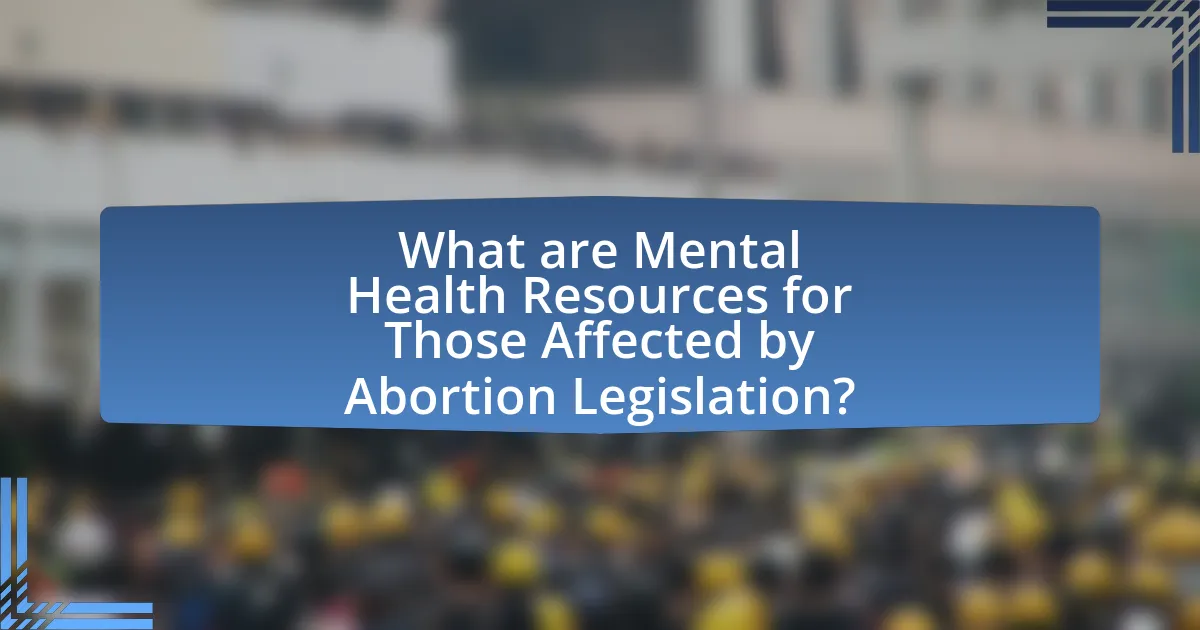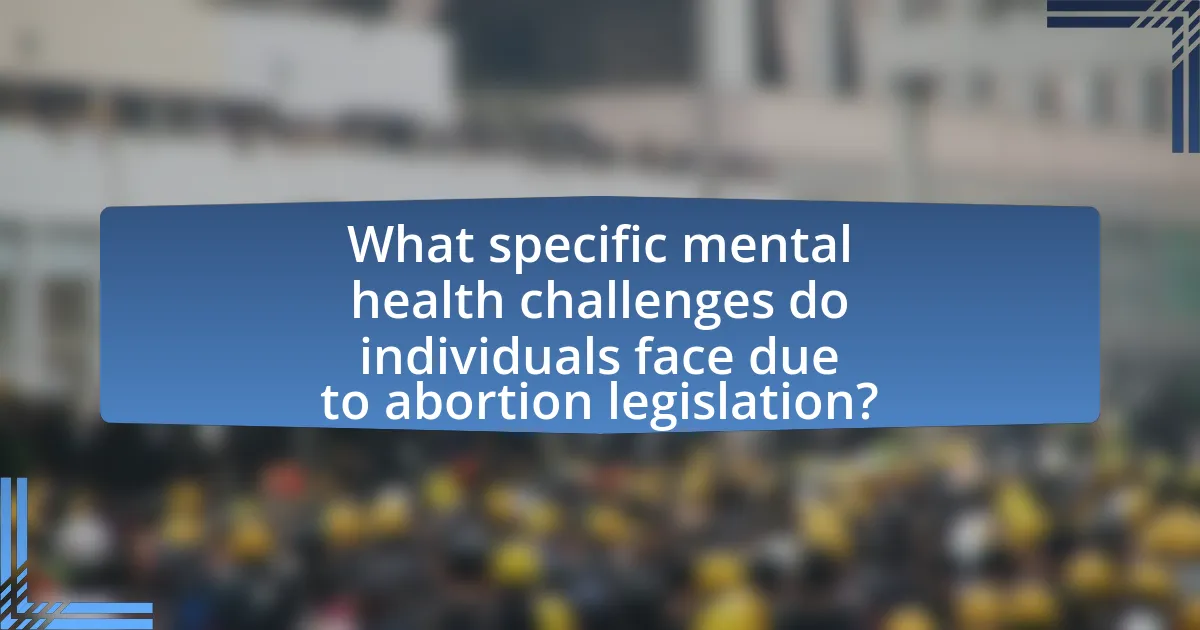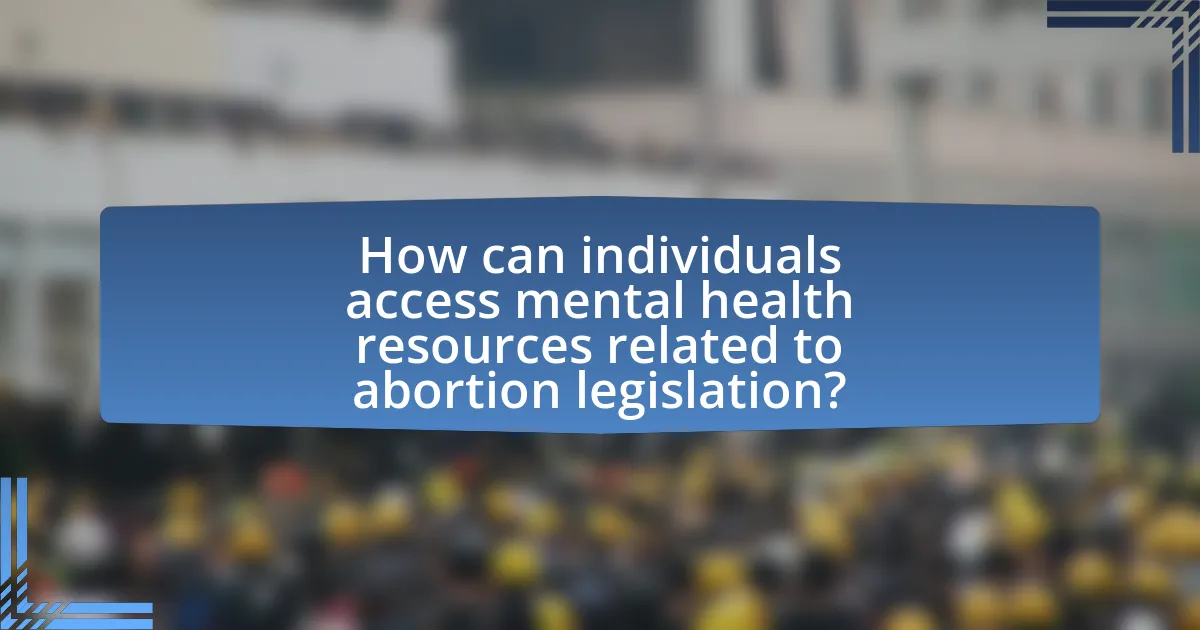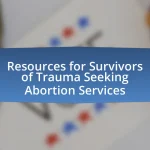Mental health resources for individuals affected by abortion legislation are crucial for addressing the emotional and psychological impacts of restrictive laws. This article outlines various support options, including counseling services, support groups, hotlines, and online therapy platforms, which provide tailored assistance to those navigating the complexities of abortion-related decisions. It highlights the specific mental health challenges faced by individuals, such as increased anxiety and depression, and emphasizes the importance of accessible mental health care in promoting well-being. Additionally, the article discusses the role of societal attitudes and stigma in shaping mental health outcomes, as well as effective coping strategies and advocacy efforts to improve mental health resources for this demographic.

What are Mental Health Resources for Those Affected by Abortion Legislation?
Mental health resources for those affected by abortion legislation include counseling services, support groups, and hotlines specifically designed to address the emotional and psychological impacts of such legislation. Organizations like the American Psychological Association provide directories of licensed therapists who specialize in reproductive health issues. Additionally, the National Abortion Federation offers a hotline for emotional support and referrals to mental health professionals. Research indicates that individuals facing restrictive abortion laws often experience increased anxiety and depression, highlighting the importance of accessible mental health care in these contexts.
How do these resources support individuals impacted by abortion legislation?
Mental health resources support individuals impacted by abortion legislation by providing emotional and psychological assistance tailored to their specific needs. These resources, such as counseling services, support groups, and hotlines, offer safe spaces for individuals to express their feelings, process their experiences, and receive guidance. For instance, studies indicate that access to mental health support can significantly reduce anxiety and depression rates among those affected by restrictive abortion laws, highlighting the importance of these resources in promoting mental well-being.
What types of mental health resources are available for this demographic?
Mental health resources available for individuals affected by abortion legislation include counseling services, support groups, hotlines, and online therapy platforms. Counseling services provide personalized mental health support, often tailored to the emotional challenges faced after abortion experiences. Support groups offer a community for sharing experiences and coping strategies, fostering a sense of belonging and understanding. Hotlines, such as the National Abortion Federation’s hotline, provide immediate assistance and guidance for those in crisis. Online therapy platforms, like BetterHelp or Talkspace, offer accessible mental health care, allowing individuals to connect with licensed therapists from the comfort of their homes. These resources are crucial in addressing the psychological impact of abortion legislation, as studies indicate that individuals may experience anxiety, depression, or other mental health issues related to their experiences.
How do these resources address specific mental health challenges?
These resources address specific mental health challenges by providing targeted support and information for individuals affected by abortion legislation. They offer counseling services, educational materials, and community support groups that focus on the emotional and psychological impacts of abortion-related decisions. For instance, studies indicate that access to mental health resources can significantly reduce anxiety and depression among individuals facing unwanted pregnancies or the stress of navigating restrictive abortion laws. By addressing these challenges directly, the resources help individuals process their experiences and promote mental well-being.
Why is mental health support crucial in the context of abortion legislation?
Mental health support is crucial in the context of abortion legislation because it addresses the psychological impact that abortion decisions can have on individuals. Research indicates that individuals may experience a range of emotions, including anxiety, depression, and guilt, following an abortion, particularly in restrictive legislative environments. A study published in the journal “Psychological Medicine” found that women who faced barriers to accessing abortion services reported higher levels of mental distress compared to those who could access care without obstacles. Therefore, providing mental health resources is essential to help individuals cope with these emotional challenges and to promote overall well-being in the face of complex and often stigmatized decisions surrounding abortion.
What psychological effects can arise from changes in abortion laws?
Changes in abortion laws can lead to significant psychological effects, including increased anxiety, depression, and feelings of loss among individuals affected by these laws. Research indicates that restrictive abortion laws can exacerbate mental health issues, as individuals may feel a lack of control over their reproductive choices, leading to heightened stress and emotional distress. A study published in the American Journal of Public Health found that women denied abortions were more likely to experience anxiety and lower self-esteem compared to those who received the procedure. Additionally, the stigma surrounding abortion can contribute to feelings of isolation and shame, further impacting mental well-being.
How do societal attitudes towards abortion influence mental health?
Societal attitudes towards abortion significantly influence mental health by shaping the emotional and psychological experiences of individuals who undergo the procedure. Negative societal perceptions can lead to feelings of shame, guilt, and isolation, which are associated with increased risks of anxiety and depression. Research published in the journal “Social Science & Medicine” by Major et al. (2009) indicates that women who perceive stigma surrounding abortion are more likely to experience adverse mental health outcomes. Conversely, supportive societal attitudes can foster a sense of acceptance and reduce psychological distress, highlighting the importance of societal context in shaping mental health outcomes related to abortion experiences.

What specific mental health challenges do individuals face due to abortion legislation?
Individuals face several specific mental health challenges due to abortion legislation, including increased anxiety, depression, and feelings of guilt or shame. Research indicates that restrictive abortion laws can lead to heightened stress and emotional distress, as individuals may feel trapped in unwanted pregnancies or face barriers to accessing necessary healthcare. A study published in the American Journal of Public Health found that women denied abortions were more likely to experience anxiety and lower self-esteem compared to those who were able to obtain the procedure. Additionally, the stigma surrounding abortion can exacerbate feelings of isolation and contribute to mental health issues, as individuals may fear judgment from their communities or families.
How can trauma from abortion legislation manifest in mental health?
Trauma from abortion legislation can manifest in mental health through increased anxiety, depression, and post-traumatic stress disorder (PTSD). Individuals affected by restrictive abortion laws may experience feelings of helplessness, loss of control, and emotional distress due to the limitations placed on their reproductive choices. Research indicates that women facing such legislation report higher levels of psychological distress, with studies showing that 30% of women who sought abortions in restrictive environments experienced significant mental health challenges. The emotional toll can be exacerbated by societal stigma and lack of support, leading to long-term mental health issues.
What are common symptoms of anxiety and depression related to this issue?
Common symptoms of anxiety and depression related to abortion legislation include persistent sadness, excessive worry, changes in appetite, sleep disturbances, and feelings of hopelessness. Research indicates that individuals affected by restrictive abortion laws often experience heightened emotional distress, which can manifest as anxiety and depression. A study published in the American Journal of Public Health found that women facing such legislation reported increased rates of anxiety and depressive symptoms, highlighting the psychological impact of these policies on mental health.
How does stigma affect mental health outcomes for those impacted?
Stigma negatively impacts mental health outcomes for individuals affected by abortion legislation by increasing feelings of shame, isolation, and anxiety. Research indicates that individuals facing stigma are more likely to experience depression and lower self-esteem, as societal judgment can lead to internalized negative beliefs about themselves. A study published in the Journal of Health and Social Behavior found that stigma surrounding reproductive health issues, including abortion, correlates with higher rates of psychological distress and decreased access to mental health resources. This evidence underscores the detrimental effects of stigma on mental well-being for those impacted by such legislation.
What role do support groups play in mental health recovery?
Support groups play a crucial role in mental health recovery by providing a safe space for individuals to share experiences and receive emotional support. These groups facilitate connection among participants, reducing feelings of isolation and fostering a sense of belonging. Research indicates that individuals who engage in support groups often experience improved mental health outcomes, such as reduced anxiety and depression levels. For instance, a study published in the Journal of Clinical Psychology found that participants in support groups reported significant improvements in their mental well-being compared to those who did not participate. This evidence underscores the effectiveness of support groups in enhancing recovery processes for individuals facing mental health challenges.
How can peer support enhance coping strategies?
Peer support enhances coping strategies by providing individuals with shared experiences and emotional validation. This form of support fosters a sense of belonging and reduces feelings of isolation, which are crucial for mental well-being. Research indicates that peer support groups can lead to improved coping mechanisms, as participants learn from each other’s strategies and resilience. For instance, a study published in the Journal of Affective Disorders found that individuals engaged in peer support reported lower levels of anxiety and depression, highlighting the effectiveness of shared experiences in developing coping skills.
What are the benefits of sharing experiences in a group setting?
Sharing experiences in a group setting enhances emotional support and fosters a sense of community among individuals facing similar challenges. This collective sharing allows participants to feel understood and validated, which can significantly reduce feelings of isolation and anxiety. Research indicates that group therapy can lead to improved mental health outcomes, as individuals benefit from hearing diverse perspectives and coping strategies. For instance, a study published in the Journal of Counseling Psychology found that group therapy participants reported higher levels of satisfaction and lower levels of distress compared to those who engaged in individual therapy. This evidence underscores the effectiveness of shared experiences in promoting mental well-being, particularly in contexts such as navigating the emotional complexities surrounding abortion legislation.

How can individuals access mental health resources related to abortion legislation?
Individuals can access mental health resources related to abortion legislation through various channels, including healthcare providers, mental health organizations, and online platforms. Healthcare providers, such as primary care physicians and gynecologists, can offer referrals to mental health specialists who understand the implications of abortion legislation. Mental health organizations, like the American Psychological Association, provide resources and support specifically addressing the emotional impact of abortion. Additionally, online platforms, including telehealth services, allow individuals to connect with licensed therapists who specialize in reproductive health issues. These resources are essential for addressing the psychological effects of abortion legislation, which can include anxiety, depression, and feelings of isolation.
What are the best practices for finding mental health support?
The best practices for finding mental health support include seeking professional help from licensed therapists or counselors, utilizing hotlines and support groups, and exploring online resources tailored to specific needs. Research indicates that individuals who engage with mental health professionals report improved emotional well-being and coping strategies. For instance, a study published in the Journal of Counseling Psychology found that therapy can significantly reduce symptoms of anxiety and depression, highlighting the effectiveness of professional support. Additionally, organizations like the National Alliance on Mental Illness provide directories for finding local mental health services, ensuring individuals can access appropriate care.
How can online resources be utilized effectively?
Online resources can be utilized effectively by ensuring they are accessible, reliable, and tailored to the specific needs of individuals affected by abortion legislation. Accessibility includes providing information in various formats, such as articles, videos, and interactive tools, which cater to different learning styles and preferences. Reliability is achieved by sourcing information from reputable organizations, such as the American Psychological Association, which offers evidence-based guidelines and support for mental health. Tailoring resources to specific demographics, such as age or cultural background, enhances relevance and engagement, thereby improving the likelihood of individuals seeking help. For instance, studies show that targeted online interventions can significantly reduce anxiety and depression among affected individuals, demonstrating the effectiveness of well-designed online mental health resources.
What should individuals look for in a mental health professional?
Individuals should look for qualifications, experience, and a therapeutic approach that aligns with their needs when selecting a mental health professional. Specifically, qualifications include relevant degrees and licenses, while experience should encompass familiarity with issues related to abortion legislation and its psychological impact. A therapeutic approach that resonates with the individual, such as cognitive-behavioral therapy or trauma-informed care, is essential for effective treatment. Research indicates that a strong therapeutic alliance significantly enhances treatment outcomes, underscoring the importance of finding a professional with whom one feels comfortable and understood.
What are some effective coping strategies for those affected?
Effective coping strategies for those affected by abortion legislation include seeking professional counseling, engaging in support groups, practicing mindfulness and stress-reduction techniques, and maintaining open communication with trusted friends or family. Professional counseling provides a safe space to process emotions and experiences, while support groups offer shared understanding and community. Mindfulness practices, such as meditation and deep-breathing exercises, can reduce anxiety and promote emotional well-being. Open communication fosters connection and support, which is crucial during challenging times. Research indicates that these strategies can significantly improve mental health outcomes for individuals facing distressing situations related to abortion legislation.
How can mindfulness and self-care practices improve mental health?
Mindfulness and self-care practices can significantly improve mental health by reducing stress, enhancing emotional regulation, and promoting overall well-being. Research indicates that mindfulness meditation can decrease symptoms of anxiety and depression, with a study published in JAMA Internal Medicine showing that mindfulness-based interventions lead to moderate improvements in anxiety, depression, and pain. Additionally, self-care practices, such as regular physical activity and adequate sleep, contribute to better mental health outcomes by fostering resilience and improving mood. These practices create a supportive environment for individuals to process their emotions and cope with challenges, particularly in the context of stressors related to abortion legislation.
What role does community engagement play in mental well-being?
Community engagement significantly enhances mental well-being by fostering social connections and support networks. Engaging with a community provides individuals with a sense of belonging, which is crucial for emotional health. Research indicates that social support from community involvement can reduce feelings of isolation and depression, as evidenced by a study published in the Journal of Community Psychology, which found that individuals who actively participate in community activities report higher levels of life satisfaction and lower levels of anxiety. This connection to others not only promotes resilience but also encourages individuals to seek help and share experiences, further contributing to improved mental health outcomes.
What steps can individuals take to advocate for better mental health resources?
Individuals can advocate for better mental health resources by engaging in community outreach, contacting policymakers, and raising awareness through social media campaigns. Community outreach involves organizing local events to educate the public about mental health issues related to abortion legislation, which can foster dialogue and support. Contacting policymakers allows individuals to express their concerns and push for legislative changes that prioritize mental health funding and resources. Additionally, social media campaigns can amplify voices and share personal stories, creating a broader understanding of the mental health challenges faced by those affected by abortion legislation. These actions are supported by studies indicating that grassroots advocacy can lead to increased funding and improved mental health services in communities.
How can raising awareness about mental health needs influence policy change?
Raising awareness about mental health needs can significantly influence policy change by mobilizing public support and prompting lawmakers to prioritize mental health in legislation. Increased awareness leads to a better understanding of the mental health challenges faced by individuals, particularly those affected by abortion legislation, which can result in advocacy for policies that provide necessary resources and support. For instance, studies have shown that when mental health issues are highlighted in public discourse, there is a corresponding increase in funding for mental health services and the implementation of supportive policies, as seen in the Mental Health Parity and Addiction Equity Act of 2008, which aimed to ensure equal treatment for mental health conditions. This correlation demonstrates that informed public opinion can drive legislative action, ultimately leading to improved mental health resources for vulnerable populations.
What actions can individuals take to support others in similar situations?
Individuals can support others affected by abortion legislation by actively listening and providing emotional support. This involves creating a safe space for open dialogue, where individuals can express their feelings without judgment. Research indicates that emotional support significantly reduces feelings of isolation and distress, which are common in such situations. Additionally, individuals can share relevant mental health resources, such as hotlines or counseling services, which have been shown to improve coping mechanisms and overall mental well-being. Engaging in advocacy for reproductive rights can also empower those affected, as collective action has historically led to policy changes that support mental health and well-being.


